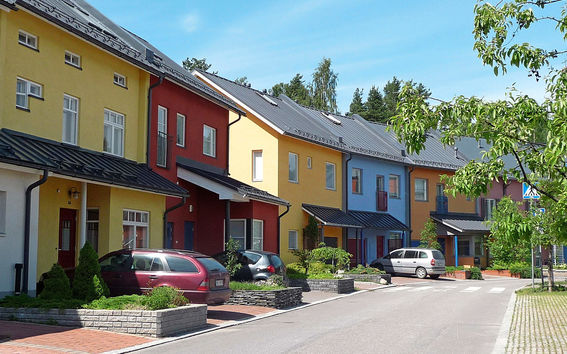New survey: 75% of single-family house owners would pay more for an environmentally friendly home

Up to 75% of Finnish single-family house residents would be willing to pay more for a home that promotes sustainable development. More than half would like to see statutory reporting of the carbon footprint for detached houses or limit values set for the carbon footprint. These were the findings of a survey commissioned by Aalto University and the Ministry of the Environment, which examined the environmental attitudes of single-family house residents. Over 1,700 members of the Finnish Home Owner’s Association and 17 members of the Finnish Association for Manufacturers of Prefabricated Houses participated in the survey.
Nearly half of the respondents could pay 10% more for a home that was clearly more environmentally friendly. One in ten would be willing to pay 20% more. The majority of respondents felt that the environmental friendliness and usability of the home were more important than low price. The survey also revealed that people wanted access to objective and easy-to-understand information, especially about the entire lifecycle of the home, origin of materials, recyclability and possible adverse effects.
In contrast, the respondents felt that reducing the size of housing and increasing the density of residential areas were not suitable methods of improving environmental friendliness. Two-thirds of the respondents live in cities.
According to an Aalto University report, reducing the carbon footprint of a single-family house would not necessarily increase its construction costs. A comparison of the carbon footprint calculations and cost data for buildings at the Tuusula Housing Fair 2020 showed that the single-family homes with the smallest carbon footprint were on average slightly less expensive (EUR 3,107/m2) than those that caused the highest emissions (EUR 3,404/m2).
House manufacturers and home buyers have different views
According to the respondents, the industry, product manufacturers and service providers as well as politicians, legislators and civil servants have the greatest responsibility for developing environmentally friendly housing.
However, the representatives of the house manufacturers who participated in the survey believed that prices, habits and customs are obstacles to environmentally friendly choices. Only one third of the participating representatives supported the carbon footprint reporting obligation or a limit value for house manufacturers, and more than half opposed the reporting obligation or emission limits. According to the representatives, information on environmental issues is easily available and no comprehensive environmental information is needed at this time.
The corona crisis has influenced general environmental attitudes
The survey also investigated the impacts of the corona pandemic on living space arrangements, place of residence or plot selection. Finnish single-family homes have met housing needs well during the first phase of the corona crisis, and 90% of the respondents felt that the pandemic had no impact on housing.
On the other hand, corona did affect general environmental attitudes, with 18% of all respondents considering environmental issues more important than before the pandemic. Female respondents accounted for 23% of this figure and people over the age of 70 for 24%.
Proximity to nature, a peaceful area and safety are emphasised when selecting a place to live or a plot. The respondents considered good access to services an important factor. On the other hand, many people dream of a spacious residential environment and living outside the urban area, which conflicts with the desire to be close to services.
The Aalto University Department of Architecture and the Ministry of the Environment carried out a survey on the environmental attitudes related to single-family housing in May 2020. Over 1,700 members of the Finnish Home Owner’s Association and 17 members of the Finnish Association for Manufacturers of Prefabricated Houses participated in the survey. The survey is part of the ‘Resource-smart with a human touch’ project funded by the European Regional Development Fund. The project is coordinated by the municipality of Lapinjärvi. The project focuses on developing an operating model for resource-wise construction and living in the future Husulanmäki residential area in Lapinjärvi. The issues covered by the model takes include the sensible resource use, the well-being of the environment and people as well as new product and service solutions.
For more information, contact:
Matti Kuittinen, professor, Aalto School of Art, Design and Architecture
matti.kuittinen@aalto.fi
Tel. +358 50 594 7990
Pekka Heikkinen, professor, Aalto School of Art, Design and Architecture
Pekka.heikkinen@aalto.fi
Tel. +358 50 3773 786
Read more news

Two Unite! Seed Fund projects involving Aalto secure top EU funding
Two prestigious EU grants have been awarded to projects that were initially supported with Unite! Seed Funding. Both projects involve Aalto.
Major funding powers development of next-generation machine technology aimed at productivity leap in export sectors
The BEST research project is developing new types of sealing, bearing, and damping technology.
The TAIMI project builds an equal working life – a six-year consortium project seeks solutions to recruitment and skill challenges
Artificial intelligence (AI) is changing skill requirements, the population is aging, and the labor shortage is deepening. Meanwhile, the potential of international experts often remains unused in Finland. These challenges in working life are addressed by the six-year TAIMI project funded by the Strategic Research Council, and implemented by a broad consortium.






